They’ve sent me to France.
The Salon CTCO trade show in Lyon is a chance to mix and discuss partnerships with industry association leaders from across Europe, create memories with the few Americans who made the trip and conduct the interview that would be the backbone for this story.
My subject is Steven Baumgaertner.
He is not a household name for many American promo pros but certainly has that status in his own country and further across the European merch industry. He’s the CEO of Cybergroup International (PPAI 607044, Gold), an umbrella organization of global distributor operations that is headlined by Heidelberg, Germany-based cyber-Wear, the country’s largest distributor.
Baumgaertner may be the most influential figure in European promotional products, an entrepreneur who, alongside his co-founding partner Roman Weiss, started the business in a basement some 30 years ago. They’ve evolved, scaled and built a client roster of massive multinational corporations. In addition to Europe, Cybergroup does business in China, the Middle East and the U.S.
Most interesting to me, and a key factor in earning it the No. 34 ranking in the 2024 PPAI 100, Cybergroup is on the forefront of sustainability among all distributors worldwide, an innovator partnering with suppliers to find creative ways to upcycle used materials and save resources during production.
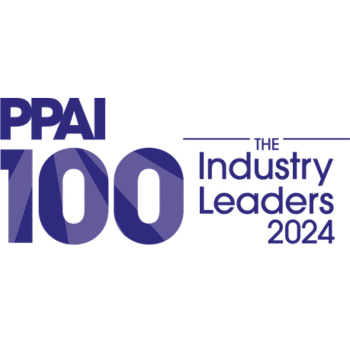
I’ve learned a lot about Baumgaertner and the company since PPAI made the decision to include non-North American members on this year’s list. Soon thereafter, we recognized that Cybergroup would rank highest among them. It’s a nice new angle for telling the story of PPAI 100 in Year 2, and a good reason for me to visit Lyon.
And I’m glad to finally be there. Fifteen hours after passing through security at DFW, a bamboo keycard clicks my hotel room unlocked and I walk in, drop my stuff by the door and flip the light switch on. Nothing. I do the off-on-off-on thing a few times before finally realizing something’s up.
Oh. This is one of those places that makes you put the keycard in the little slot so you don’t waste electricity. There are no water bottles in the room, either. A card left on the desk encourages guests to refill using a hallway fountain.
DIDN’T GET THIS IN YOUR EMAIL? Subscribe to PPAI Newslink.
And this is when it hits me that when people in our business give the common line that Europe is five or 10 years ahead of the U.S. on sustainability, they’re not just talking about the promotional products industry, but everything and everybody.
In the tiny, fuel-efficient cab on the way to the expo hall before the trade show opens, I receive a disappointing email:
Dear Josh
Due to strikes in Germany my flight back from Lyon is cancelled and I will not make it to Lyon. I’m super sorry.
Have fun in Lyon.
Steven
I’ve crossed an ocean for this interview. But in a story that is really about the intersection of globalization and our industry’s sustainability imperative, it’s a sacrifice that seems fitting.
***
The trip to Lyon had a second life, as it were. I did have fun. And I held some other important meetings on upcoming projects. Over the next few weeks, I sat at my dining room table for two lengthy Teams calls with Baumgaertner.
We had met before, at The PPAI Expo 2024. During a dinner I organized for about 20 C-level leaders, he sat at the end of a long table, mostly listening to his American counterparts. When the conversation turned to a distributor’s responsibility to guide end buyers toward more sustainable products, he spoke with conviction. His company doesn’t even give clients a choice, he said, instead presenting only the more sustainable options available through his suppliers.
“We really teach our customers,” Baumgaertner tells me later. “For the same budget, they should buy less – but better stuff – instead of just wasting budget for the cheap, shitty items.”
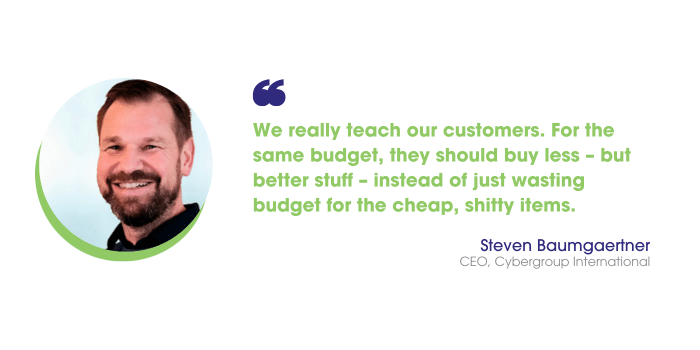
At the dinner, two execs from major American distributors say it’s not their role to impose ethics but simply to deliver what the client wants, quickly and with room for profit. This is a traditionally capitalist sentiment, of course, part of the mindset that makes America’s promo industry perhaps twice as large as promo in the European Union.
Cybergroup’s method is harder. It requires a more bespoke approach to client service and to do some tedious homework on suppliers: Trust and verify. This comes at a monetary cost that Baumgaertner and Weiss, the CFO, freely admit the company has yet to recoup. But both believe it will pay off in the long run.
The same willingness to do difficult things, sacrificing immediate results, has been felt in the company’s attempts at international expansion. It is wildly successful in Germany, but overseas growth has been slow going. Cultural differences with would-be U.S. clients have been a source of frustration for Baumgaertner.
All told, the company brought in about $50 million in 2023, and its sales have more than doubled in a bounce-back from the pandemic-marred 2020, earning it PPAI 100 High Marks in the Growth category to go along with its High Marks, naturally, for Responsibility. Clients include the likes of Porsche, Audi and Deutsche Bahn, the German railway.
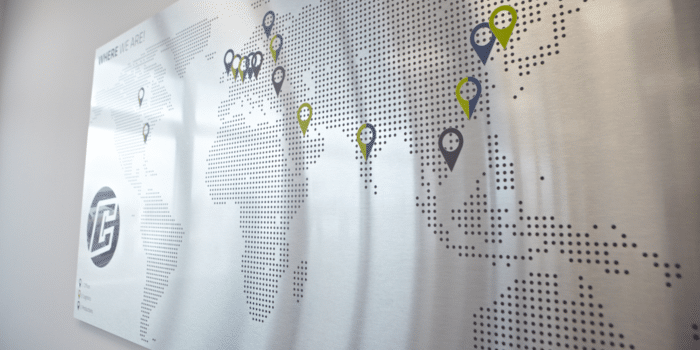
Kjell Harbom, an industry stalwart in Europe, says, “If you come to Steven or his company and say, ‘We need a thousand pens,’ they say, ‘Sorry, give us your marketing plan for the next 12 months and we will tell you what you need. Don’t ask us for pens.’
“Big companies, that’s heaven for them. They don’t have the small customers. They have the big customers, and the big customers are really keen about sustainability.”
Securing huge accounts creates the opportunity for a more focused approach to customer service. “He knows his customers so well that he knows how to offer the right article for their company, for their purpose, for their campaign,” says Petra Lassahn, director of Germany’s industry trade show, PSI. “He is full of ideas. He’s a maker. And he’s very professional, very much into details; he knows everything he’s doing very well.”
Baumgaertner is the face of the company, but no one can do it all alone. Cybergroup employs roughly 215 people worldwide, including about 100 in Germany. Weiss has been the company’s 1A from the beginning. The two met as teenage classmates during the early ’90s and made their first money together by creating and selling class slogan T-shirts to graduating students. The two have grown up, started families and become more independent over time.
“We’re still close,” Weiss says. “It’s just different. I also think we have not changed a lot in our personalities. We’ve changed in our lifestyles, and we changed everything around, but he’s still the sales guy and I’m still the numbers guy, and that was pretty much what we decided in my grandpa’s basement.”
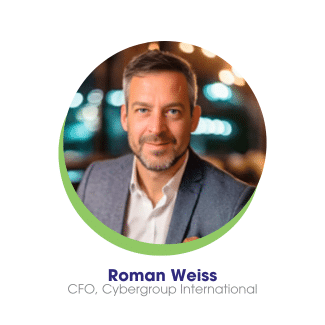
Weiss explains that they’ve avoided major conflicts thanks to a mutual understanding that on any issue, the last call belongs to the person ultimately responsible. The biggest clashes have been about expansion. As the revenue leader, Baumgaertner wants to add clients. But Weiss makes the point that even now, the company only has the structure of a $25-$30 million business. They’ve exceeded that by maximizing efficiencies but recently took on private equity partners to help allow for fuller scale, including the success outside Europe that has been elusive.
The injection of private equity cash will be crucial to Cybergroup’s long-term health. But Baumgaertner is banking on another business partner being just as important to the company’s future.
***
Last December, I received in the mail a smartly designed, square coffee table book about a 24-year-old Swiss company I’d never heard of: bluesign (PPAI 825888, Standard-Base).
The firm had just joined PPAI as a business services member. Worldwide, it employs more than 100 environmental experts, many of them Ph.D. chemical scientists who work closely with manufacturers and suppliers to ensure production meets bluesign’s rigorous environmental, worker and consumer safety requirements in pursuit of textile materials certifications. If the manufacturing and chemistry don’t meet the criteria, bluesign creates a roadmap for improvement.

The book tells the story of bluesign’s vision for an apparel supply chain that has a greatly reduced impact on the planet and its most vulnerable inhabitants, people included. Its pages have been earmarked for me by semi-retired American promo vet Rod Brown, CAS, 2020’s winner of the PPAI H. Ted Olson Humanitarian Award. In these golden years, Brown is taking some time for leisure, but he also travels the world building homes in developing areas, professing the need for more sustainability in promotional products and leveraging his connections to help people driving at that goal.
We meet in Las Vegas the day after my C-suite dinner, where Brown introduces me to several bluesign operatives. Soon joined by Baumgaertner, the group becomes a chorus in laying out the urgent case for American promotional products firms to follow Baumgaertner’s lead on sustainability and the verification of green claims.
Cybergroup had been on the journey for several years before becoming a bluesign client and beginning to use its leverage with suppliers to have them test their products with the company. But he points out that access to bluesign’s method of testing all the raw components of a garment, as well as the dyes and chemicals used in its production, have prepared Cybergroup for strict new E.U. regulations to guard against greenwashing that will become effective in 2026.
“I totally believe in bluesign as the answer to this,” Baumgaertner says.
The company approached Baumgaertner with its services in 2021, seeing like-minded Cybergroup as the perfect initial client to explore the promotional products space. Over the last three years, Cybergroup and a number of its key supplier partners have invested tens of thousands of Euros to enhance the demonstrability of product responsibility claims.
Both Baumgaertner and Weiss consider this something of a down payment on the cost of doing business in the near future. In some instances, clients already insist on bluesign certifications. In at least one instance, Cybergroup has removed programs from longtime supplier partners that did not engage bluesign.
“The only question from a money perspective was always, more or less, do we need it to stay in business?” Weiss says. “And then it actually doesn’t matter if it’s $2,000, $5,000 or $50,000.”
***
From the lips of CEO Daniel Rüfenacht, the average cost to partner with bluesign is more like $25,000 to $30,000, but it can push to upwards of $40,000 for larger firms with complex needs.
Like Cybergroup, bluesign makes no apologies that its services are geared toward larger clients. Along with testing products for suppliers, it is seeking to work with the largest distributors who have strong leverage with their supply chain partners.
But when I speak to Rüfenacht via Teams in March, he doesn’t excuse smaller players from an obligation to verify their green claims.
“If they buy left, right and center just to get a lower price, it’s going to be a challenge for them,” he says. “I would see it more as an opportunity for them to position themselves if they have a good relationship with their suppliers.”
READ MORE: See the full 2024 PPAI 100 rankings.
A step beyond the concerns of industry small businesses fighting ever harder against well-financed competition, Rüfenacht casts a pall over the prospects of the entire industry if it doesn’t get on board with green certifications. Historically, bluesign’s focus has been on serving retail brands (clients include Adidas, North Face and J.Crew). These typically have been more likely to draw the attention of nongovernmental organizations than a rather secluded industry like ours.
But who’s to say that lasts forever?
In March, France’s lower house of Parliament approved a bill that would impose a $10 tax on every fast fashion item sold in the country, with the aim of reducing that industry’s environmental impact. The bill, still pending approval by the French Senate, also forbids the advertising of those products.
“If France starts, it will proliferate into Europe,” Rüfenacht says. “Europe will adopt the same law, and at some point, the U.S. would be the same.”
He points to the impending failure of the United Nations’ 2030 Sustainable Development Goals as a potential geopolitical crossroads. The 17 environmental and social targets (specific metrics to define cleaner water or reduced inequality, among others) were adopted by all member nations in 2015. Currently none of the targets appears likely to be met.
“Is there a reason to have promotional articles?” Rüfenacht asks. “That’s the point that we are talking about here. At some point, the legislation will kick in, and we’ll forbid it.”
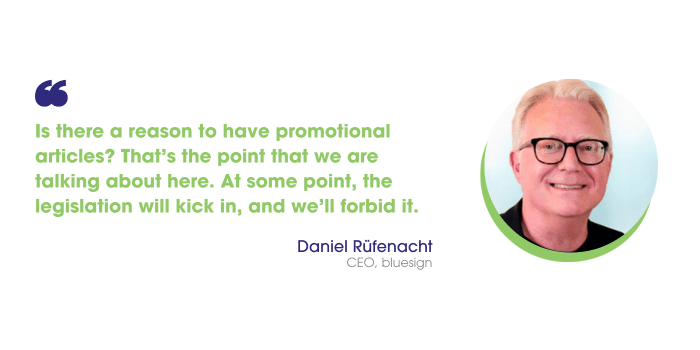
And there’s the reason to tell this story rather than one about the other 99 distributors on the list. PPAI is committed to ensuring that the industry’s progress is known, and the Association is ready to shape any legislation that would pose a threat.
But we must all know the risks of not taking steps together toward responsibility.
***
Thankfully, PPAI is not alone in its advocacy. Count Baumgaertner among those who would prefer his livelihood to not be outlawed.
He has become a champion for preserving the medium’s history. He was the driving force behind the Museum of Promotional Articles exhibition, which debuted at the PSI show in Düsseldorf in January, and he is currently working on a book project detailing promo’s past, present and hopeful future.
This kind of advocacy is something he views as necessary to elevate the industry. Like sustainability, it doesn’t need to be his ultimate passion to make it worthwhile. He conducts our second interview from his Audi hybrid. But during that conversation, he tells me he would never call himself an “eco guy.”
“I’m not growing my own stuff in my garden and only using the bike,” he says. His commitments may be good for the planet, but they are also just pragmatic business, and only part of the story that Baumgaertner is selling to clients.
“Whenever we think about something new, we’re always trying to be the leader,” he says of Cybergroup. “Maybe not on sustainability, but in every other aspect, the leading companies in the U.S. are much more professional, because they’re much bigger. But I think the whole industry has to get more professional. That was a reason why we said, OK, bluesign makes sense.”
Rüfenacht is also a pragmatic businessperson in his own right. Expanding services from retail fashion into new markets, including promo, was among his first priorities after becoming CEO in 2021. While it specializes in textiles, bluesign can also assess plastics and any product that requires chemicals in its production, he says.
Promo clearly represents a warm market.
Reaching out from its base in Switzerland, bluesign has really just begun to court American distributors. Like all PPAI business services members, it can be found in the PPAI Solutions Center. It’s listed in the Sustainability category alongside numerous other members offering services to help industry firms of all sizes and types with various needs in their respective green journeys.
This is how a global industry works toward sustainability – and toward sustaining itself.
We don’t have to go it alone.
Ellis is the publisher and editor-in-chief of PPAI Media.


